Diablo 2 Resurrected: Beginner's Guide
Last update:
This page of the Diablo 2 Resurrected guide features useful tips which should make the beginning of your playthrough easier and smoother. Most of the featured tips have been prepared with newcomers in mind, but seasoned players should also find useful advice here. The Resurrected edition changes and modernizes the original gameplay in a few ways.
First steps
Here you will find some tips aimed at newcomers to the series, who only just began their adventure:
- Obtain equipment - at the beginning, equip everything you find. Your starting equipment usually consists of just a weapon (and sometimes a shield).
- The key to winning fights is using hotkeys. Switching skills as well as quickly replenishing your mana and health are two necessary elements to winning fights against enemies and bosses. For details, check the Controls page.
- Starting weapon - Throwing knife. A great weapon for every non-magic user, and for magic users who didn't learn any skills yet. You can easily get through the first 5-10 EXP Levels by using throwing knives only (note: only if you throw them, they're much weaker in melee). The knives have a high attack rate and can reach smaller enemies - like the annoying Fallen - even as they're running away. Javelins are also a great choice but you can throw them only 30 times, as opposed to the knives' 120 uses. You need to pay attention to their number - if you run out of knives, you won't be able to use them in melee either. You can replenish your knives in the camp by talking to Charsi and using the repair icon.
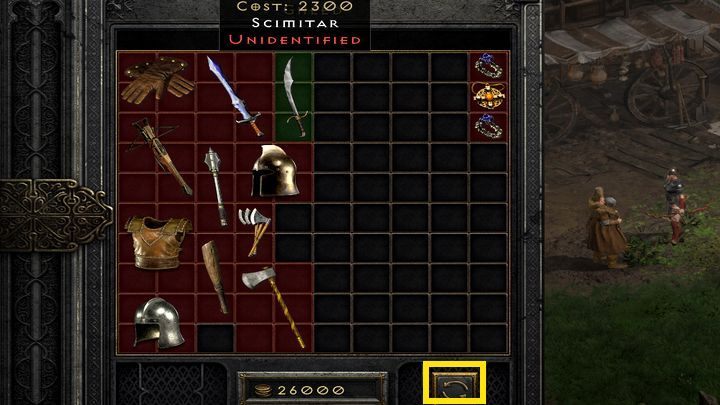
- You can also obtain equipment from later Acts. You can do so by gambling. In every city you can find a trader offering unidentified items, which are often on a much higher level than your current equipment. There's no way to know before buying the item, so you'll often have to spend a lot of money. In return, however, you can obtain an item you'll be using for a very long time. In the first camp unidentified items are offered by a trader named Gheed. The list of purchasable items can be refreshed by talking to the trader again, or by pressing a button in the lower-right corner of the screen.
- Always try to complete a stage (defeat a boss, find a new waypoint, explore the location) in one go. Restarting the game will resurrect all enemies you killed along the way.
- Death has a price. Every time you die, you lose some of your gold - even if it's stored inside of the Stash. It's worth it to spend your money on Gambling.
- All traders purchase your goods for the same price.
- Each act has a set, maximum price the traders are willing to pay if you try to sell them something (In Act 1 it's 5000 gold, the maximum price increases by 5000 with each act); you should store expensive items in the Stash to sell them in a later Act for a bigger profit.
- You can often finish missions in an Act in any order you wish. Some of them reward the player with interesting bonuses and are worth saving for later. More detailed info can be found in the Walkthrough.
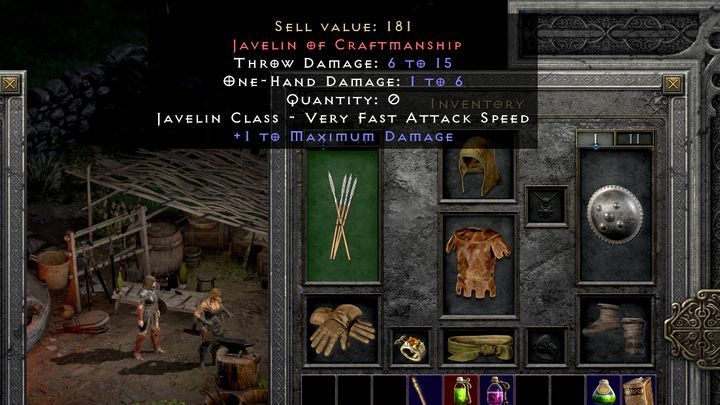
- Weapons such as javelins or throwing knives can be used both in ranged and melee combat. Keep in mind that if you run out of a weapon's uses, you won't be able to use it at all, even in melee. Info about the remaining uses of a weapon is relayed to the player by the crossed arrows symbol on the right side of the screen.
- Never discard a throwing weapon after running out of uses. If you're using a common weapon, you can replenish its uses by combining two weapons into one. This does not apply to Special Weapons and Magic Weapons. You can replenish a throwing weapon's uses by talking to the local blacksmith, for a small price. In the Rogue Encampment, said blacksmith is Charsi. This can be done in the equipment repair panel.
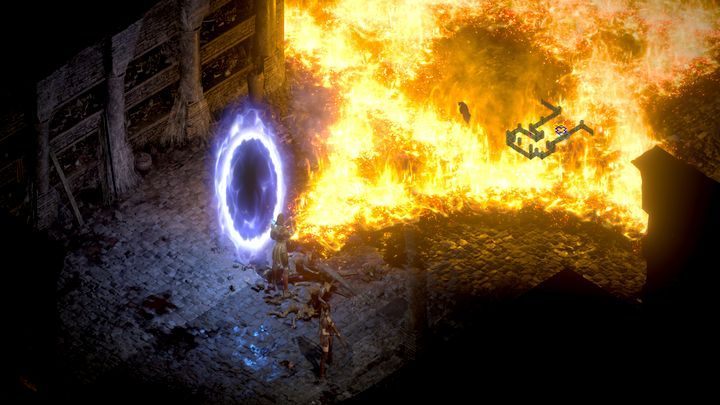
- If you know you're about to face a difficult boss or a large group of enemies, it's worthwhile to open a portal before the fight begins. That way you can avoid death by making a quick escape.
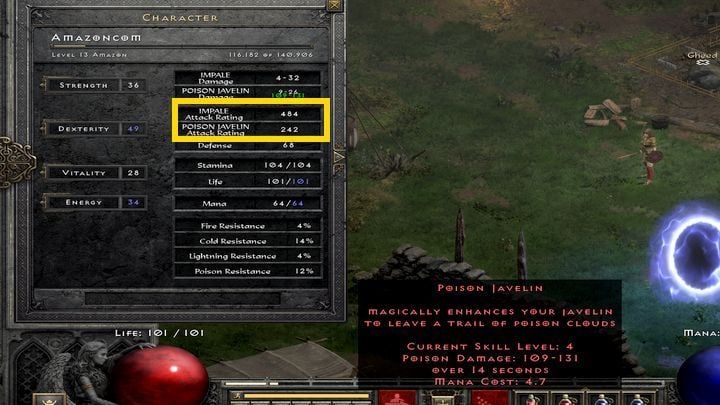
- Under the A key you can find the character's stats screen. Additionally, it also shows the parameters of magic attacks / active skills. By switching between known abilities you can see how effective they are compared to each other and to your basic attack.
- Conjured portals disappear when you turn off the game - they can't be used to quickly teleport to a previous area or to farm bosses quicker.
- After finishing the game and defeating all bosses, the game can be continued on a higher Nightmare difficulty; by finishing it you'll unlock Hell difficulty, the ultimate challenge the game has to offer.
- Some rules of the game change on higher difficulty levels. More info regarding these changes can be found in the Difficulty Levels chapter. On higher difficulties you can once again reset your character's skills and stats.
Money and loot
Below, you'll find info about efficient money making and items obtainable in the game:
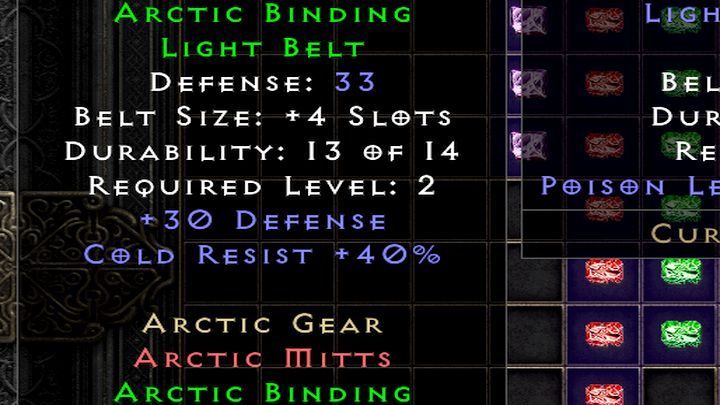
- Item's color - it defines equipment even before you pick it up: White - basic, common items without any magical features, blue - items with additional features, such as improved stats or increased hit recovery, grey - containing gem / rune slots (are magically upgradeable), yellow - special magic items with more than a single bonus, green - green objects form sets - matching magic items which offer powerful bonuses when you wear all of them at once. Finding an entire set is no easy task.
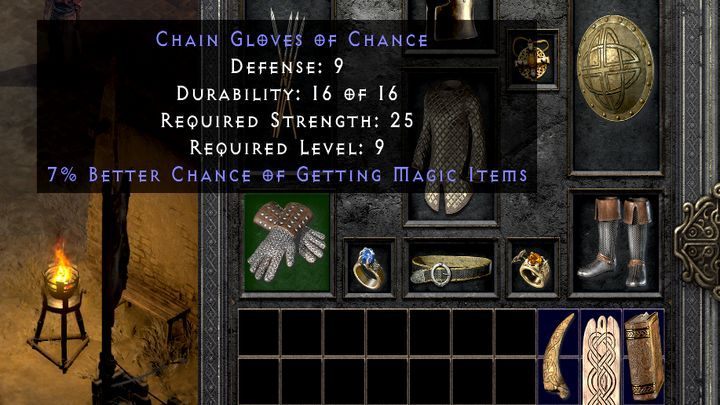
- To increase your chance of finding magic items equip gear with a Magic Find bonus. Bonuses stack and can be found in every item. You can also place a Gem inside of an armor piece with an empty gem slot to give it the Gem's specific bonus.
- If you find a valuable weapon that sells for 5000 in Act 1, 10000 in Act 2 e.t.c, you can keep it for later - if you can fit it in the Stash. Those are the maximum selling prices the merchants are willing to pay in a given act. The gear itself is worth much more, and you can sell it for more in later acts.
- Drop sound cues. You'll quickly learn to pay attention to the sound that accompanies drops. Sometimes it's difficult to notice a small gem or ring falling out of an opened chest. A metallic, high-pitched sound is a sign you should look around for a valuable item nearby.
- Spend money freely, don't worry about it too much. In the later stages of the game, money is mostly used for buying expensive items as a form of gambling - when buying an unidentified item you don't know its stats, and have to hope it's something useful. Usually it's not. Money can be tempting in the early game, but you'll profit the most if you don't excessively collect every item you drop and don't return to the camp every few minutes. Always buy what you think could be useful to you in this specific moment - portal scrolls, potions. Starting from Act 2, the piles of gold dropped by enemies will often reach 100 coins.
- An additional argument discouraging from hoarding money is the fact that you lose a set percentage of your wealth every time you die - even if you hid your gold in the Stash.
- Valuable loot can most often be found in chests, under rocks, e.t.c. Valuable items are most often gems, amulets / rings and charms. Sometimes even common enemies can drop valuable things. Therefore, you shouldn't ignore any of these objects. Each mini-boss (a colored enemy) is guaranteed to drop at least one blue item. Story-related bosses (even the less important ones from singular quests) often drop a yellow item or several blue ones.
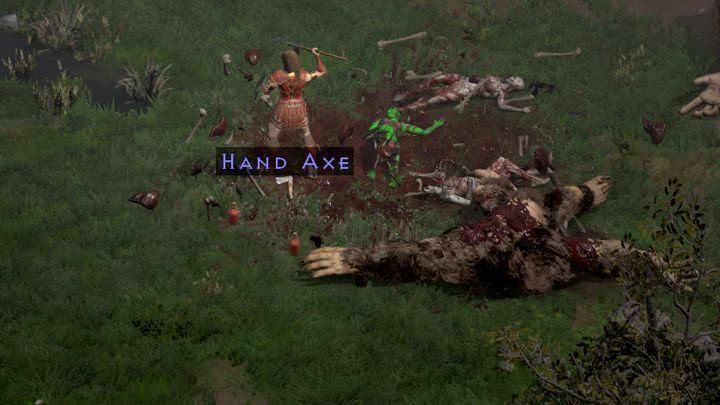
- Don't pick up everything you see - it's not viable to constantly return to the camp just to sell worthless junk. In the first stages of the game you can even refrain from picking up plentiful but small coin piles. You should pick up: uncommon vials, jewelry, gems, runes, magical items (they can be recognized by their unusual color), staffs, wands (they're usually the most valuable common items), unidentified gear and, in the early game, throwing knives (they sell for around 500 gold pieces). Avoid damaged items. Even if they're high-tier, you won't sell them for much.
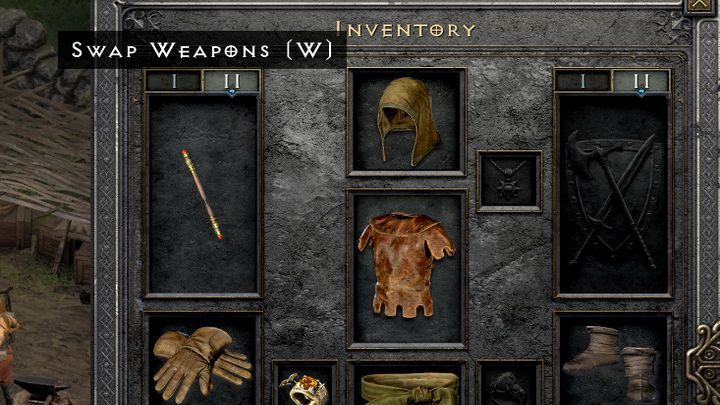
- If you aren't using your secondary weapon slot, you can use it to carry more items. That single slot can carry a bow, shield or a polearm, which would otherwise take up a lot of inventory space.
Equipment and items
Here you'll find some tips regarding worn gear:
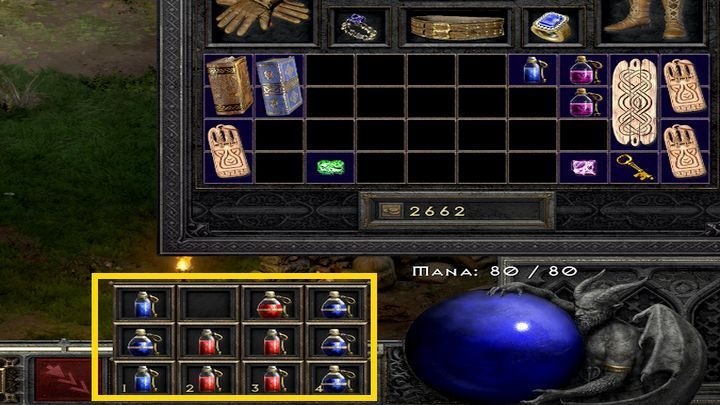
- By equipping yourself with a better belt, you increase the number of potion slots quickly accessible with a hotkey. Belts of the two lowest tiers contain two rows of slots.
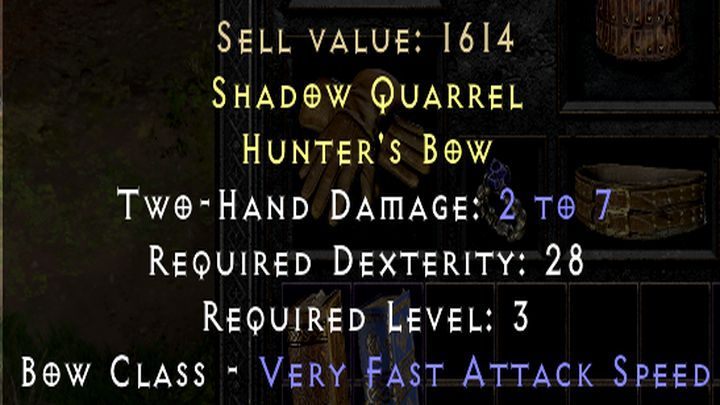
- Most equippable items have a strength or dexterity requirement. Some items are exclusive to a specific character class. The best items have multiple bonuses. As regards the most interesting weapons: Weapon class - many weapon-related skills are only usable while wielding a weapon of specific class; attack speed - usually slower weapons deal more damage (compared to other weapons on the same level). Choosing between fast or strong attacks is just a matter of preference. While choosing a weapon you should consider your skills, mana capacity and attack bonuses it offers.
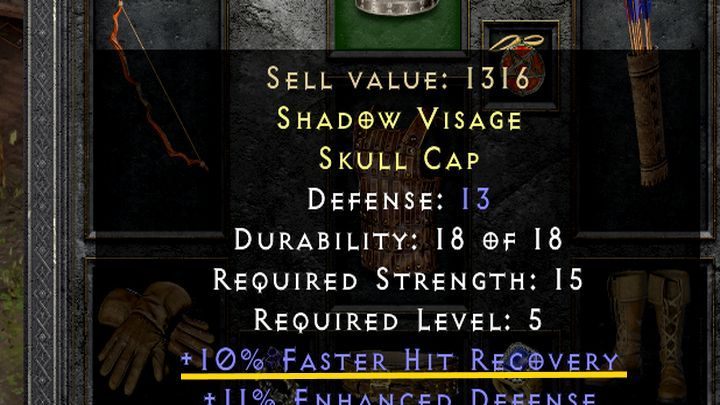
- Hit recovery is important for any melee-focused character. It affects how quickly you can move and attack again after being hit by an enemy.
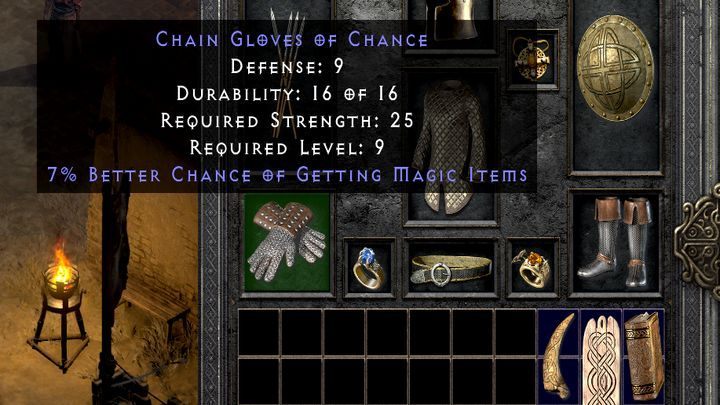
- Magic Find is one of the better bonuses you can find on amulets, armors, rings and charms. It allows you to find rare gear more easily, increasing its drop rate. It also means your financial situation will become much more comfortable.
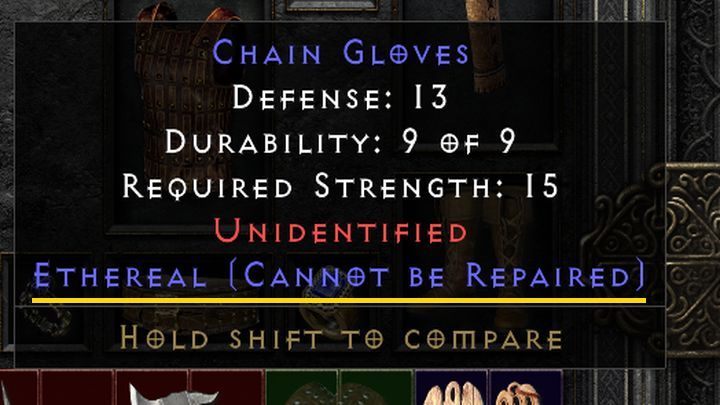
- Ethereal items - these items cannot be repaired. They are usually very powerful, but once they break, they're gone forever.
Gameplay
Diablo 2 Resurrected is a hack'n'slash. It contains some features which helped the game remain unusual and popular when it was first released. The game's main features you should know about, if you're not familiar with the original, are:
- The world map is generated upon starting a new game. The order of visiting areas, key places, key items and area connections are static and unchanged (although area connections appear in different places).
- If you die, you respawn in the camp / town. From there you can return to the place of your death to recollect the loot held by your character's corpse. Your equipment isn't lost - all of your equipped items and carried gold can be reclaimed in the place of your death. Unfortunately, you're still punished for dying (by losing a set percentage of the money you had at hand / inside the Stash).
- Whenever you start the game, all monsters (including bosses) respawn. This allows you to easily generate huge quantities of loot and constantly develop your character in case of meeting an unpassable roadblock. However, if you turn the game off while fighting a boss, you'll need to defeat all enemies on the way once again. The portals you set up will also disappear.
- Every act is its own closed-off world with unique properties, most importantly the levels of purchasable and droppable equipment. Are you reaching an Act's finale? Don't buy new equipment. Usually it won't be worth much in the next Act.
- Once per game you can reset your character's stats and skills - (by talking to Akara after finishing the Den of Evil quest) - it's worth doing after reaching character level 30, once you gain access to all your skills and make a decision on how to develop your character further. After finishing your first playthrough and starting a new one on a higher difficulty level, you'll be able to reset your skills once again.
- Three difficulty levels are available: Normal, Nightmare and Hell. Each difficulty is unlocked after beating the game on the previous one. When starting the game again on a higher difficulty you can still use the same character.
You are not permitted to copy any image, text or info from this page. This site is not associated with and/or endorsed by the developers and the publishers. All logos and images are copyrighted by their respective owners.
Copyright © 2000 - 2025 Webedia Polska SA for gamepressure.com, unofficial game guides, walkthroughs, secrets, game tips, maps & strategies for top games.
